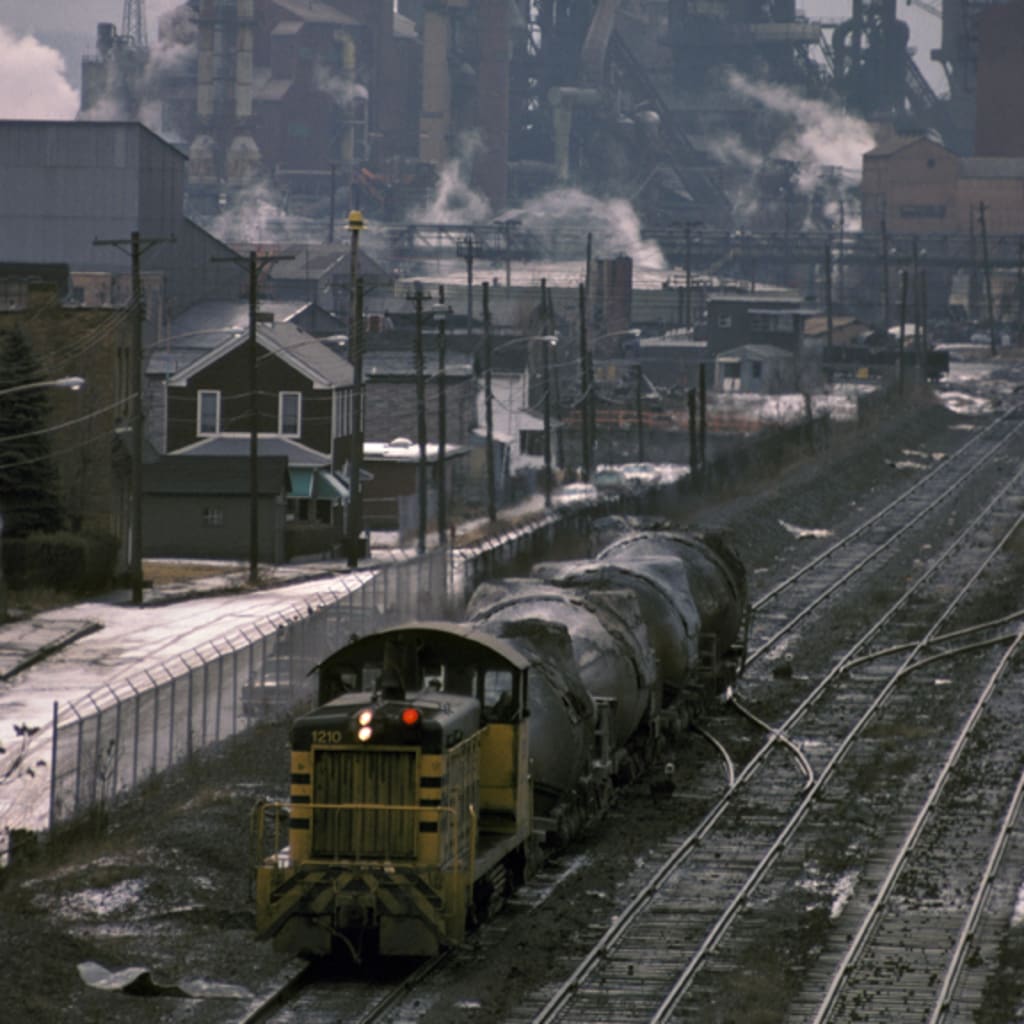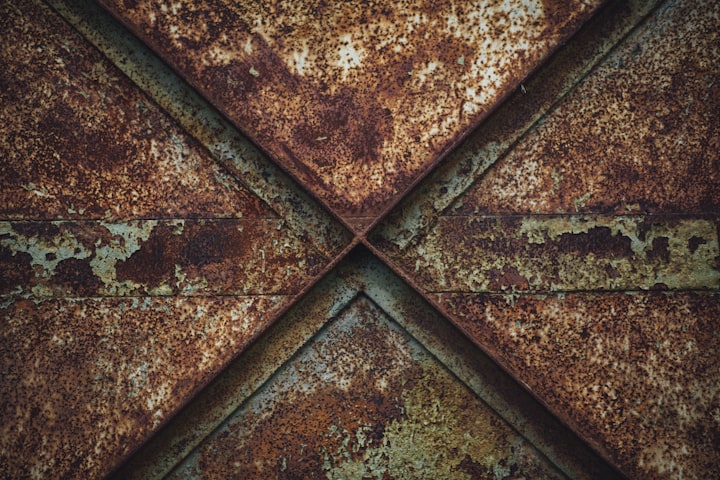A City Of Mud And Filth
It is a city of mud and filth. Of smoke and acid. Of oil and coal.

It is a city of mud and filth. Of smoke and acid. Of oil and coal. It is a metropolis of ruin and twisted metal. A Haven for rats and a hunting ground for vultures. Its dwellers die young and the fortieth birthday is often thought to be the last. It is in essence, the modern world. A world broken by everything with nothing left to save it.
Mole fingered his sagging face and winced at what he saw. Eyes, deep-set and buried into his skull, stared back with fright. Black bags grouped beneath his eyes as if a barrier keeping them in place. He had formed jowls that hung by his neck and hair grew in patches atop his sickly red-raw scalp.
He gripped the sides of the foggy mirror and his reflection pulled him close and he breathed in and out in raspy breaths that broke the tapping of the water hitting the bottom of the washbasin. He put his fingers into his mouth and they groped his black, jagged teeth and he nearly vomited at the image of it - a black and grey void, mottled with blisters and ulcers and the erosion caused by the bad, acrid air. What little remained of the man in the mirror was inside, and even that, he was convinced, was eroding by the second. The mind, the only element of his being untouchable by the reprehensible metamorphosis of defiant survival, was under attack by the longevity of it, and what the long years of bitter struggle had truly wrought upon him.
He took up his heavy coat and threw it over his shoulder. Outside globs of grey snow would be falling, and the ground would be crisp and hard and the mud which would have been cast aside by the tracks of the heavy vehicles; dried into hard, frost tipped dunes and cannaling the road up and down between the narrow byways of the ruined factories and disheveled Nissen huts.
He cast a look into the mirror once more and peered over his sloped, sunken shoulders to the door - nothing but a wooden slat covered in manky carpet. It was the very thought of the outside world that kept him in, and yet without it, he would not be able to hide inside. There was a cruel irony to the life that had become him, and in turn, he was doomed to suffer the very curse of which in turn allowed him to hide, if only for a moment, from the outside world.
Through the carpeted veil the cold hit him bitterly. The sky was overcast and grey, the color of metal that had existed long beyond its purpose. There was a stench in the air, the smell of which Mole was accustomed to. It had no name nor bore no similarity to any substance in existence. It simply existed from the toxic chaos of the world about him. It existed from the mucus and decay of the great burning of things, of coal and wood and flesh and faith. A smell that itched the lungs and assaulted the mind. A smell that dried the eyes and bent the knees. He brought the sleeve of his heavy overcoat to his mouth and gasped, the air worse than it had been the very hours he had slept. Somewhere in the distance, a great clattering of metal sounded beyond the growling of the flatbed trucks which grumbled past, shoveling more dark grey snow onto the drifts which groped at the second- story windows of the crumbling buildings and poured from the ground floor rooms of the moulding old town.
"So you’re not dead then?"
A man was sitting with some ten others on the back of a stripped truck, the canvas was torn away and only the metal frame left, giving little cover from the cold. The man looked frozen and all the others gripped their armpits and shivered for eternity.
Mole raised a hand and trod towards the truck, another narrowly missing him as the machine roared past, beeping.
The journey to the camp was short but the weather turned the smallest of journeys into misery. The snow came down like grit, tearing the flesh and attacking the eyes. There was little cover to be had in the back of the truck, which pressed on through a great open square that had suffered a great upheaval, a mangled scape of stone and iced mud. A wooden track had been laid for the vehicles, yet it was only wide enough for the vehicles, and the others who trod on by foot were forced to navigate the small canyons and byways formed in the mounds of petrified earth. All about the perimeter of the square, peering in with jeering fascination was a great encirclement of old buildings, ruined and near collapse. Amongst the deep dug trenches below the slatted road were soup kitchens and burning barrels and deep pits where fossil fuels burned. People mingled though spoke only if necessary and they walked like a workforce from hell, shuffling and freezing to death in all the decay.
Mole probed them with interest, for those unlucky enough to survive the elements without shelter nor decent warmth were those who had come from far away. They had been forbidden homes or tenements and had been reduced to rats. Mole thought if he died, a lottery would be taken and one of those unfortunate ghouls could take his home. There were hundreds and thousands of people and only a couple thousand buildings yet suitable for life. Mole had one and his friend had another. Eventually, there would be none left standing at all.
The work camps were not camps at all. To call them as such would be a grievous insult. It was a field of mud that stretched far towards a burnt- out forest and down in the opposite to a river which had gone brown and black with refuse. In the distant hills, which had once been mined for ore and stone, lay broken and misshapen, guarded by long forsaken machinery whose arms seemed to hold up the great mounds of rubble with strained longevity and which crisscrossed as if committing to a final salute before they had starved of fuel and died.
The camps themselves were a place no man would want to linger long. Thin roads made up of sodden cardboard and wooden pallets gave access to a thousand tents, which mazed about the camp in all directions. Men with guns stood guard on its peripheries, mindful of the hills and the forests that looked on with menacing gazes, waiting for the last of mankind to die. A patient, silent revenge. Though the dogs that roamed wild had become the companions of the guards, and the guards would pet and feed their favorites and shoot the others for the workers to eat. Death was seemingly everywhere. It had become such a part of the tapestry that it was the stitching - microbial and insignificant.
The camps however were not made to permanently hold the workforce but to give them somewhere to rest and eat their feted food when the worst of the snows came. The work was hard and difficult and there was no pay except that of the food they earned for their long hours and back-breaking work. The work itself was simple in a way but yet more dangerous was why they did it and why they dug grave after grave after grave in the frozen earth.
Mole had seen the warehouses once where the coffins were kept, heavy and dull and fashioned of lead. They were terribly heavy and often needed winches to put down below but the winches often broke or rusted from neglect and there was no one left with either the knowledge or inclination to replace them.
They slid like sacks of broken bones from the back of the truck and landed heavily into the dirt below. The cold of the dead earth seemed to sap their strength the very moment their patched boots sank and then at the behest of a rifled guard they trod to the commissary to get their shovels and then like ghosts marched out towards the lifeless, unmarked planes before the broken hills and blackened forest to begin their work.
A grave an hour was all that was expected which would have been reasonable if not for the fact that the dying were burying the dead. Mole knew that it was unfair to ask such a thing of a decaying, broken workforce such as they were, but once it had been a grave every thirty minutes and had only been repealed because by the end of the ten-hour shift there were more graves needed than those that had already been dug.
Next, just as a fresh layering of toxic snow began to fall, the dumper trucks arrived; great hulking monsters of machinery, and gargled as they came to a whining halt. Within there were hundreds of led coffins, stacked as high as the walls of the truck's basin. Their men clambered down, funny coloured and ghostly thin, and began to wave the workers over to them.
Mole covered his face with his greatcoat for he did not want to catch what the drivers had. It was a bad disease, drawn into their lungs from the rotting, infected corpses of whom they packed into their trucks day by day and one that was terribly lethal. Many did the same, some having the gumption to bring their own masks. The ones who had not performed these duties before looked on at them with stark curiosity, their eyes widened as if they had stepped on a landmine and now feared removing their feet.
Mole looked down into that deep, freezing pit and thought perhaps he gazed down through a door into hell. His partner, who looked grim and freezing, shoved him to help and they took up the heavy lead coffin and slid it into that dark abyss, where it crashed with a dull, yet satisfying thud. Inside were the bodies of those who had died in the factories. Some died from the leaking radiation of the plants and others died from diseases that were no better than the radiation sickness which warranted the use of such heavy, sturdy caskets. Mole thought it strange how poor their allotted job in life was and yet there were those even more wasted upon the breaking wheel of a ruined life, and he looked up at his partner and the back down into the abyss and shuddered to think that he should think himself so lucky.
By the end of the day he was broken and a wretched thing to see. His partner, and perhaps ‘friend’, huddled together on a wooden bench in the soup kitchen over a steaming dish of anemic, furry broth. It tasted vile but the ulcers in his mouth let him not suffer too much of the taste. Someone was outside throwing up, and they guessed he was new.
After they had eaten a bell was rung and the signal to gather and go home. As they shuffled out back into the cold the newcomer was already dead and lay in a pool of his own, acrid vomit. Some don't, they're dying, some refuse to accept it and then there are those who die never knowing they had been dying all along.
Mole looked at the young corpse and thought that’s how he’d like to go, but then he knew from a short life digging holes in the frozen earth and drinking disgusting broth and pulling his teeth out in front of the mirror and tugging tufts of hair from his head that perhaps that way to die was not for him. For Mole it seemed would live forever, or perhaps long enough to see his fiftieth birthday.






Comments
There are no comments for this story
Be the first to respond and start the conversation.